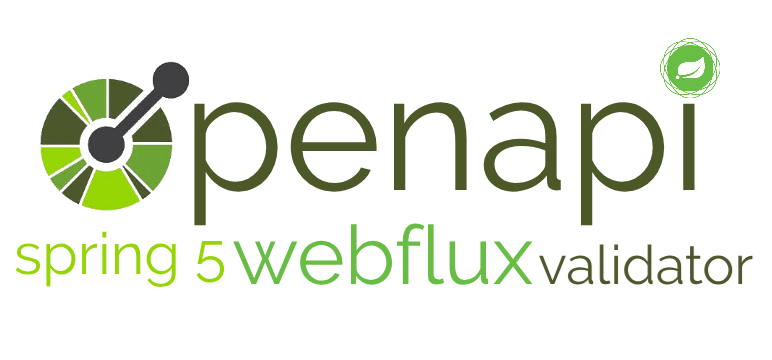A friendly kotlin library to validate API endpoints using an OpenApi 3.0.0 or Swagger 2.0 specification. Great with webflux functional. It works happily with any JVM language including Java >=8.

Supports specifications in YAML and JSON
See this complete Spring 5 Webflux example that uses openapi-spring-webflux-validator.
Prequisites
Java 8 or greater
Install
Maven
<dependency>
<groupId>io.github.cdimascio</groupId>
<artifactId>openapi-spring-webflux-validator</artifactId>
<version>2.0.0</version>
</dependency>Gradle
compile 'io.github.cdimascio:openapi-spring-webflux-validator:2.0.0'For sbt, grape, ivy and more, see here
Usage (Kotlin)
This section and the next describe usage with Kotlin and Java respectively.
Configure (Kotlin)
This one-time configuration requires you to provide the location of the openapi/swagger specification and an optional custom error handler.
Supports JSON and YAML
import io.github.cdimascio.swagger.Validate
val validate = Validate.configure("static/api.yaml")with custom error handler
data class MyError(val id: String, val messages: List<String>)
val validate = Validate.configure("static/api.json") { status, messages ->
Error(status.name, messages)
}with custom ObjectMapper factory:
val validate = Validate.configure(
openApiSwaggerPath = "api.yaml",
errorHandler = { status, message -> ValidationError(status.value(), message[0]) },
objectMapperFactory = { ObjectMapper()
.registerKotlinModule()
.registerModule(JavaTimeModule())
.configure(SerializationFeature.WRITE_DATES_AS_TIMESTAMPS, false) }
)Validate a request (Kotlin)
Using the validate instance created above, you can now validate a request:
without a body
validate.request(req) {
// Do stuff e.g. return a list of names
ok().body(Mono.just(listOf("carmine", "alex", "eliana")))
}with body
validate.request(req).withBody(User::class.java) { body ->
// Note that body is deserialized as User!
// Now you can do stuff.
// For example, lets echo the request as the response
ok().body(Mono.just(body))
}Usage (Java 8 or greater)
Configure (Java)
This one-time configuration requires you to provide the location of the openapi/swagger specification and an optional custom error handler.
import io.github.cdimascio.swagger.Validate;
Validate<ValidationError> validate = Validate.configure("static/api.json")with custom error handler
class MyError {
private String id;
private String messages;
public MyError(String id, List<String> messages) {
this.id = id;
this.messages = messages;
}
public String getId() {
return id;
}
public void setId(String id) {
this.id = id;
}
public List<String> getMessages() {
return messages;
}
public void setMessages(List<String> messages) {
this.messages = messages;
}
}Validate<ValidationError> validate = Validate.configure("static/api.json", (status, messages) ->
new MyError(status.getName(), messages)
);Validate a request (Java)
Using the validate instance created above, you can now validate a request:
without a body
ArrayList<String> users = new ArrayList<String>() {{
add("carmine");
add("alex");
add("eliana");
}};
validate.request(null, () -> {
// Do stuff e.g. return a list of user names
ServerResponse.ok().body(fromObject(users));
});with body
validate
.request(null)
.withBody(User.class, user ->
// Note that body is deserialized as User!
// Now you can do stuff.
// For example, lets echo the request as the response
return ServerResponse.ok().body(fromObject(user))
);Example Valiation Output
Let's assume a POST request to create a user requires the following request body:
{
"firstname": "carmine",
"lastname": "dimasico"
}Let's now assume an API user misspells lastname as lastnam
curl -X POST http://localhost:8080/api/users -H "Content-Type: application/json" -d'{
"firstname": "c",
"lastnam": "d"
}'openapi-spring-webflux-validator automatically validates the request against a Swagger spect and returns:
{
"code": 400,
"messages":[
"Object instance has properties which are not allowed by the schema: [\"lastnam\"]",
"Object has missing required properties ([\"lastname\"])"
]
}Woah! Cool!! :-D
Example
Let's say you have an endpoint /users that supports both GET and POST operations.
You can create those routes and validate them like so:
Create the routes:
package myproject.controllers
import org.springframework.core.io.ClassPathResource
import org.springframework.http.MediaType.*
import org.springframework.web.reactive.function.server.ServerResponse.permanentRedirect
import org.springframework.web.reactive.function.server.router
import java.net.URI
class Routes(private val userHandler: UserHandler) {
fun router() = router {
"/api".nest {
accept(APPLICATION_JSON).nest {
POST("/users", userHandler::create)
}
accept(TEXT_EVENT_STREAM).nest {
GET("/users", userHandler::findAll)
}
}
}
}package myproject
import io.github.cdimascio.swagger.Validate
val validate = Validate.configure("static/api.yaml")Validate with openapi-spring-webflux-validator
package myproject.controllers
import myproject.models.User
import myproject.validate
import org.springframework.web.reactive.function.server.ServerRequest
import org.springframework.web.reactive.function.server.ServerResponse
import org.springframework.web.reactive.function.server.ServerResponse.ok
import org.springframework.web.reactive.function.server.body
import reactor.core.publisher.Flux
import reactor.core.publisher.Mono
class UserHandler {
fun findAll(req: ServerRequest): Mono<ServerResponse> {
return validate.request(req) {
ok().body(Mono.just(listOf("carmine", "alex", "eliana")))
}
}
fun create(req: ServerRequest): Mono<ServerResponse> {
return validate.request(req).withBody(User::class.java) {
// it is the request body deserialized as User
ok().body(Mono.just(it))
}
}
}